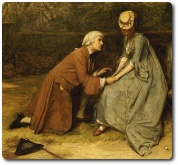Christina Rossetti, selected poems Contents
- Social / political context
- Religious / philosophical context
- Literary context
- A Better Resurrection
- A Birthday
- A Royal Princess
- At Home
- Cousin Kate
- Despised and Rejected
- Echo
- Goblin Market
- Good Friday
- Jessie Cameron
- L.E.L
- Maude Clare
- Remember
- Shut Out
- Song (When I am dead, my dearest)
- Summer is Ended
- The Convent Threshold
- The Lowest Place
- To Lalla, reading my verses topsy-turvy
- Twice
- Up-hill
- Winter: My Secret
Women
Marriage and singleness
 Many Victorians considered marriage to be at the centre of a stable society. It was widely believed that a happy family contributed to the well-being of the country. At a time when most women were forced to rely on men for their financial upkeep (since most jobs were closed to them), a good marriage was important.
Many Victorians considered marriage to be at the centre of a stable society. It was widely believed that a happy family contributed to the well-being of the country. At a time when most women were forced to rely on men for their financial upkeep (since most jobs were closed to them), a good marriage was important.
Singleness was often not accepted as a legitimate choice a woman could make. Instead, it was seen as a last resort. It was generally believed that if a woman was unmarried she was somehow not complete. Rossetti challenges this belief:
- In poems such as The Convent Threshold, as she presents strong women who renounce earthly romantic relationships in favour of a deeper commitment to God
- In Jessie Cameron, Rossetti presents a heroine whose strength is illustrated by her firm rejection of a persistent suitor.
Rejected lovers
The first half of Goblin Market and Other Poems, including the non-devotional poetry, is full of disappointed lovers who must battle with their emotions:
- In Maude Clare, the protagonist resents the marriage of her previous lover, Sir Thomas, to his young bride. She is an unusual representation of the jilted woman in that she is proud and unwilling to display any weakness
- In Cousin Kate, the rejected lover is more akin to Nell than Maude Clare in that she describes herself as a ‘cottage maiden' (line 1) who was seduced. She suggests that the son she bore with her lover is more valuable than any wedding ring and demonstrates no desire for a reunion with him. Instead, she is bitter that she was treated as a ‘plaything' (line 12) rather than an individual.
Social justice
Related to the treatment of women within and by society is Rossetti's concern with social justice. A Royal Princess demonstrates the constraints of upper class female life, as well as the near slavery of the working class. During the Victorian era, the industrial revolution contributed to the polarisation of the rich and the poor. While the aristocracy, the rulers and the factory owners became richer, the majority of the population became poorer. Rapid urbanization lead to conflict between employers and workers over longer working hours, horrific conditions and cruelty to child labourers.
Rossetti spent her life in London and witnessed thousands of people moving from the countryside to the capital for work (see The world of Victorian writers > Characteristics of Victorian Britain > Social concern). For the princess in her poem, watching the suffering of those under her father rule causes her pain. Whilst she has all the material riches she could ever want, her longing for justice, along with her loneliness and isolation, make her unhappy.
